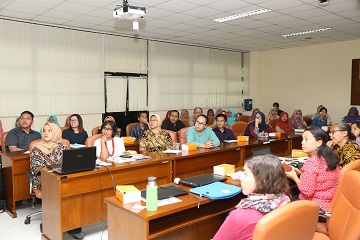Talking about Ecology and Social Affairs in Palm Oil Field, IPB Invites Ecological Experts from Germany

Palm oil has become one of most superior commodities that plays a big role in the nation’s economy. In its journey, the palm oil and its derivative product industries receives many external pressures. The pressures are mainly about the ecological problem around the palm oil plantation area, that it will threat the flora and fauna around.
Efforts to preserve the flora and fauna in the area have been done many times. One of them is the creation of forests between palm oil plantation which aims to provide a habitat for the wild animals.
Responding to that, IPB University invites experts from Gottingen University to talk about the ecological and socio-cultural impacts around palm oil plantation. The results of the research, which took place in palm oil plantation in Jambi, Sumatera, was delivered on Wednesday (6/3) in Dramaga IPB Campus, Bogor. The seminar not only talked about the impacts, but also the recommendation for a better palm oil management.
Dr. Kevin Darras, (Dept. Of Crop Sciences, Agroecology, Gottingen University), explained that palm oil plantation managed by reducing the use of chemicals can improve the quality and quantity of oil palm continuously. He gave an example, palm oil that is fertilized using organic materials can produce high-quality oil palm fruit.
Not only increasing the quality and quantity of results, using organic matter can increase the biodiversity of soil organisms and maintain soil fertility. The existence of abundant soil organisms can support the mechanical seeding process so that oil palm seeds can grow optimally.
“It should also be considered in the use of land for oil palm plantations, especially the division of land and providence of land so that there is no deforestation of the forest,” said Dr. Kevin.
Unlike Dr. Kevin, Dr. Clara Zemp (Biodiversity, Macroecology and Biogeography) prefers to implement agroforestry systems in oil palm plantations. According to her, by implementing an agroforestry system on oil palm plantations, it can increase the diversity and wealth of biodiversity in the plantation. The increasing biodiversity that has been said includes the diversity of birds, insects, bats, seeds, and plants.
The agroforestry system that can be done on oil palm plantations is to plant jengkol, durian, petai, jelutung, and meranti. Planting these plants not only can increase biodiversity but is also able to improve the economy of the communities around the plantations.
“By planting jengkol, petai, durian, and others, housewives can use their time to harvest the fruits and sell them. The profit from sales can be used for their daily needs, “concluded Dr. Clara.
The plants, continued Dr. Clara, are just examples and can be replaced with other plants according to the needs of the company and the community around the oil palm plantation.



